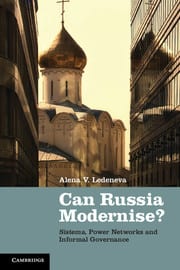Can Russia Modernise? A historian’s perspective
By Sean L Hanley, on 18 March 2014
 In her 2013 book Can Russia Modernise? Alena Ledeneva picked out key types of networks that make up Sistema: Russia’s complex, ambiguous and sometimes surprisingly effective systems of informal governance. In the second part of a three-part ‘mini-symposium’ Geoffrey Hosking assesses the book and its arguments from a historian’s perspective.
In her 2013 book Can Russia Modernise? Alena Ledeneva picked out key types of networks that make up Sistema: Russia’s complex, ambiguous and sometimes surprisingly effective systems of informal governance. In the second part of a three-part ‘mini-symposium’ Geoffrey Hosking assesses the book and its arguments from a historian’s perspective.
This is a very good book, but it shares some of the characteristics of the system it describes. One thinks one has grasped an important point, but then on the next page it turns out that point is not always valid, its operation is subtly influenced by other aspects of the system.
I would see sistema as ‘the way to get things done’, the allocation of power and resources in order to get things done. It is a system of personal relationships, accepted practices and codes of behaviour (poniatiia), not formulated or laid down explicitly but generally understood. It centres on Putin as President (and did even when he was Prime Minister: persons are more important than institutions), but his actual power within it is not unlimited. He is locked into it and his freedom of action is constantly circumscribed by it.
In this sense it confirms Foucault’s dictum about power operating along several vectors: downwards, but also upwards and sideways. Its operation is intangible: there is often no need for direct instructions or commands, because people know how they are expected to behave. Much depends on loyalty and trust, but trust which is limited and instrumental. A trusts B for certain purposes, but not more than that: I trust him because I know him well, his strengths and weaknesses, and what he is good at doing; perhaps I also have some kompromat on him. This is also forced trust, because there is no real alternative.
Alena Ledeneva identifies distinct networks around Putin: 1. an inner circle, which is agenda setting where there is daily or regular, frequent contact; 2. core contacts for the implementation of policy – people who are well known from institutional contact, and trusted to get things done without frequent contact. 3. useful friends who are similar, but with emphasis on relationships formed in youth, who are useful to get things done or trouble-shoot problems, but who will expect in return to be offered opportunities to make money; and 4. mediated contacts used for getting things done locally or at a lower institutional level. Essentially these are patron-client networks of various types. However, it should be noted, that patron-client networks differ from authoritarian ones in that clients need to get something out of them. (more…)
 Close
Close

